

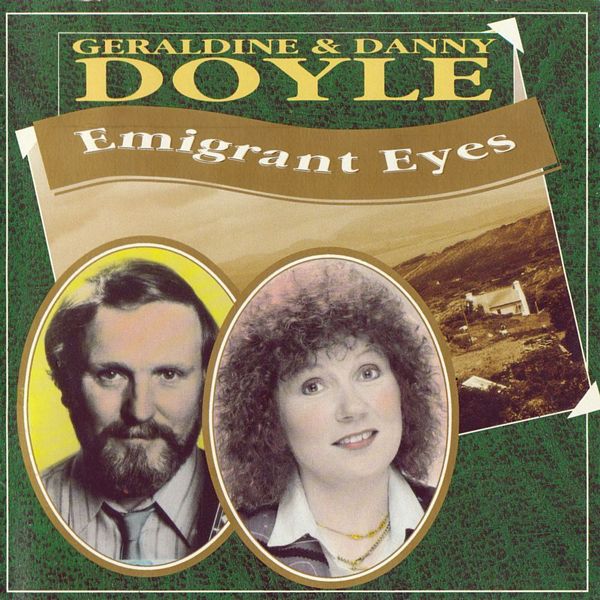 |
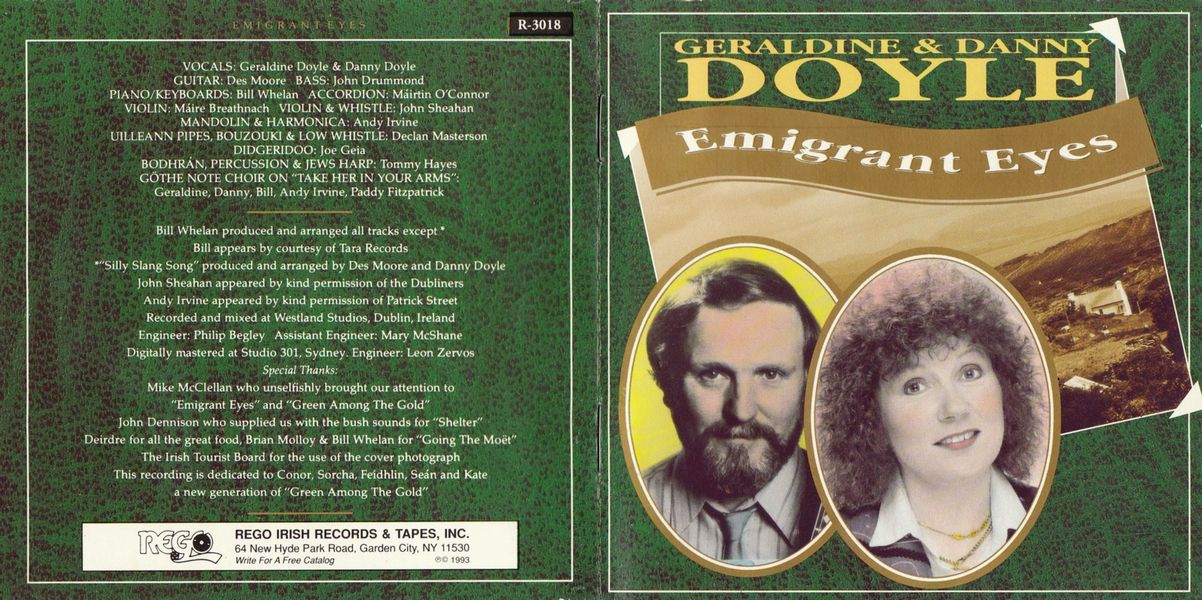
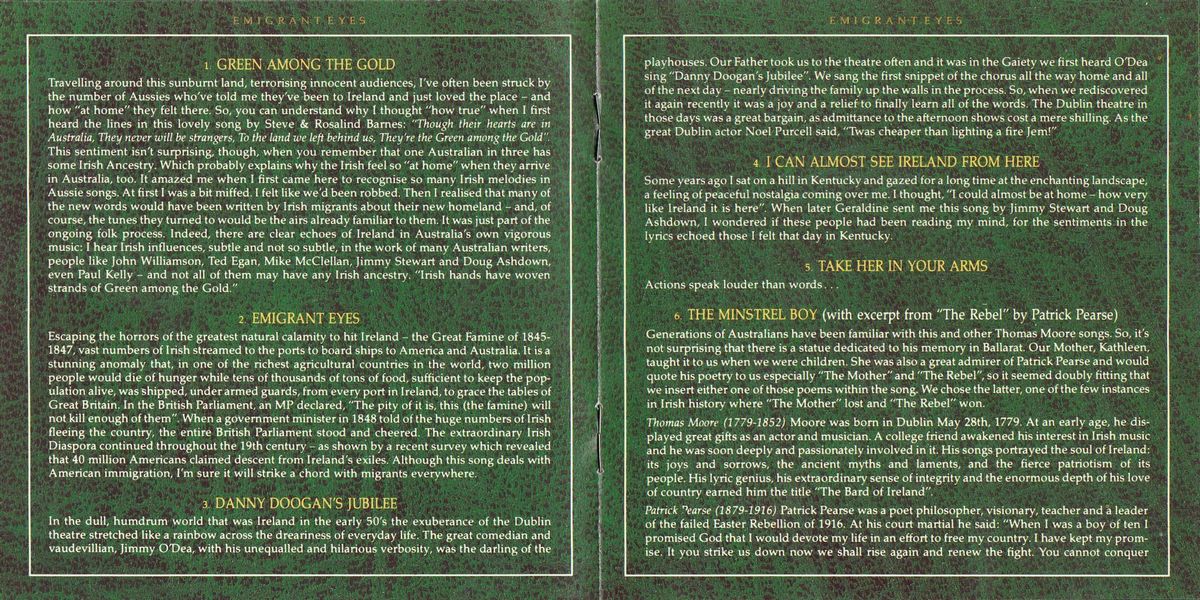 |
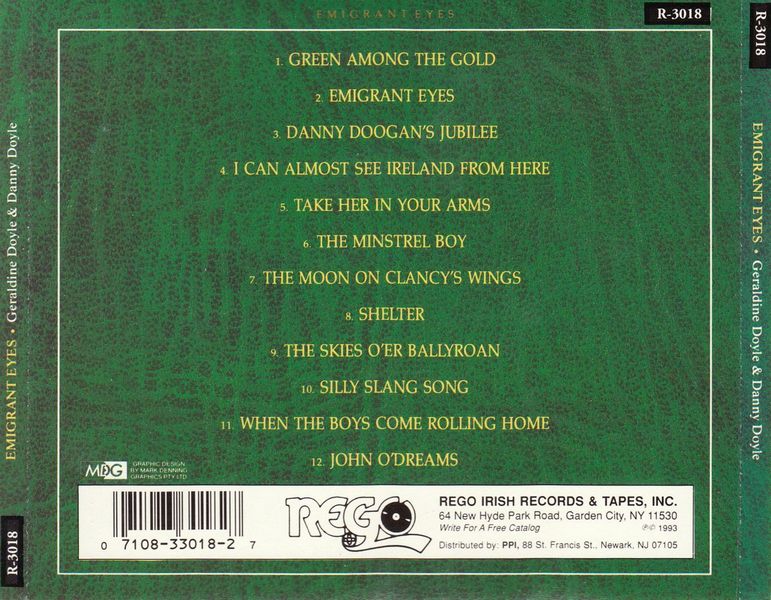
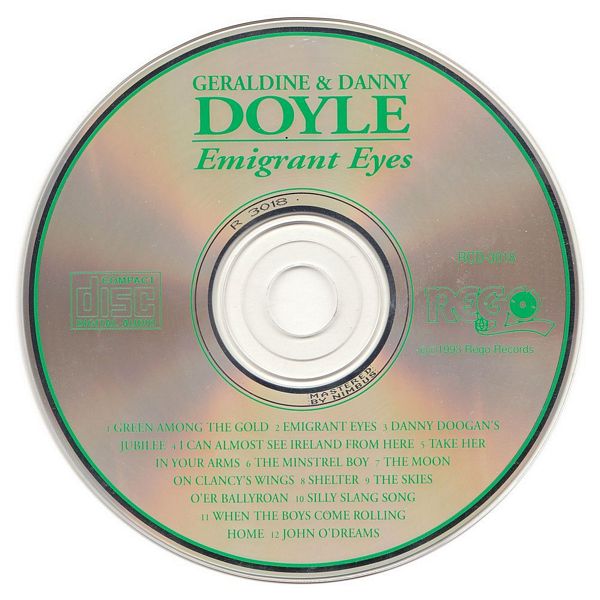
|
| more images |
Sleeve Notes
GREEN AMONG THE GOLD
Travelling around this sunburnt land, terrorising innocent audiences, I've often been struck by the number of Aussies who've told me they've been to Ireland and just loved the place — and how "at home" they felt there. So, you can understand why I thought "how true" when I first heard the lines in this lovely song by Steve and Rosalind Barnes: "Though their hearts are in Australia, They never will be strangers, To the land we left behind us, They're the Green among the Gold". This sentiment isn't surprising, though, when you remember that one Australian in three has some Irish Ancestry. Which probably explains why the Irish feel so "at home" when they arrive in Australia, too. It amazed me when I first came here to recognise so many Irish melodies in Aussie songs. At first I was a bit miffed. I felt like we'd been robbed. Then I realised that many of the new words would have been written by Irish migrants about their new homeland — and, of course, the tunes they turned to would be the airs already familiar to them. It was just part of the ongoing folk process. Indeed, there are clear echoes of Ireland in Australia's own vigorous music: I hear Irish influences, subtle and not so subtle, in the work of many Australian writers, people like John Williamson, Ted Egan, Mike McClellan, Jimmy Stewart and Doug Ashdown, even Paul Kelly — and not all of them may have any Irish ancestry. "Irish hands have woven strands of Green among the Gold."
EMIGRANT EYES
Escaping the horrors of the greatest natural calamity to hit Ireland — the Great Famine of 1845-1847, vast numbers of Irish streamed to the ports to board ships to America and Australia. It is a stunning anomaly that, in one of the richest agricultural countries in the world, two million people would die of hunger while tens of thousands of tons of food, sufficient to keep the population alive, was shipped, under armed guards, from every port in Ireland, to grace the tables of Great Britain. In the British Parliament, an MP declared, "The pity of it is, this (the famine) will not kill enough of them". When a government minister in 1848 told of the huge numbers of Irish fleeing the country, the entire British Parliament stood and cheered. The extraordinary Irish Diaspora continued throughout the 19th century — as shown by a recent survey which revealed that 40 million Americans claimed descent from Ireland's exiles. Although this song deals with American immigration, I'm sure it will strike a chord with migrants everywhere.
DANNY DOOGAN'S JUBILEE
In the dull, humdrum world that was Ireland in the early 50's the exuberance of the Dublin theatre stretched like a rainbow across the dreariness of everyday life. The great comedian and vaudevillian, Jimmy O'Dea, with his unequalled and hilarious verbosity, was the darling of the playhouses. Our Father took us to the theatre often and it was in the Gaiety we first heard O'Dea sing "Danny Doogan's Jubilee". We sang the first snippet of the chorus all the way home and all of the next day — nearly driving the family up the walls in the process. So, when we rediscovered it again recently it was a joy and a relief to finally learn all of the words. The Dublin theatre in those days was a great bargain, as admittance to the afternoon shows cost a mere shilling. As the great Dublin actor Noel Purcell said, "Twas cheaper than lighting a fire Jem!"
I CAN ALMOST SEE IRELAND FROM HERE
Some years ago I sat on a hill in Kentucky and gazed for a long time at the enchanting landscape, a feeling of peaceful nostalgia coming over me. I thought, "I could almost be at home — how very like Ireland it is here". When later Geraldine sent me this song by Jimmy Stewart and Doug Ashdown, I wondered if these people had been reading my mind, for the sentiments in the lyrics echoed those I felt that day in Kentucky.
TAKE HER IN YOUR ARMS
Actions speak louder than words …
THE MINSTREL BOY (with excerpt from "The Rebel" by Patrick Pearse)
Generations of Australians have been familiar with this and other Thomas Moore songs. So, it's not surprising that there is a statue dedicated to his memory in Ballarat. Our Mother, Kathleen, taught it to us when we were children. She was also a great admirer of Patrick Pearse and would quote his poetry to us especially "The Mother" and "The Rebel", so it seemed doubly fitting that we insert either one of those poems within the song. We chose the latter, one of the few instances in Irish history where "The Mother" lost and "The Rebel" won.
Thomas Moore (1779-1852) Moore was born in Dublin May 28th, 1779. At an early age, he displayed great gifts as an actor and musician. A college friend awakened his interest in Irish music and he was soon deeply and passionately involved in it. His songs portrayed the soul of Ireland: its joys and sorrows, the ancient myths and laments, and the fierce patriotism of its people. His lyric genius, his extraordinary sense of integrity and the enormous depth of his love of country earned him the title "The Bard of Ireland".
Patrick Pearse (1879-1916) Patrick Pearse was a poet philosopher, visionary, teacher and a leader of the failed Easter Rebellion of 1916. At his court martial he said: "When I was a boy of ten I promised God that I would devote my life in an effort to free my country. I have kept my promise. It you strike us down now we shall rise again and renew the fight. You cannot conquer Ireland, you cannot extinguish the Irish passion for freedom. If our deed has not been sufficient to win that freedom, then our children will win it by a better deed." On May 3rd, 1916, he was executed by a firing squad in Kilmainham Jail, Dublin.
THE MOON ON CLANCY'S WINGS
During a break in an Australian concert tour a few years back, Geraldine brought me to see Jimmy Stewart and Doug Ashdown. I had never met them before, but I found their love of songs and songwriting infectious and they overflowed with ideas for future songs. Outside their office, on the way back to our car, Jimmy recited a verse and chorus of a song he was working on. I loved it, and I said I had to have it. Well, the moving finger, having writ, stopped... it then took a couple of years' nagging to get the finished product. It was more than worth the wait, lads. Thanks.
SHELTER
Eric Bogle must be some kind of Celtic Wizard! How else could he know what is in the soul of so many of us? I suspect most Aussies, whether migrant or native born, will feel the "stirring of the heart" as I did when I first heard this song. It expresses such unabashed affection for this wonderful "Dreamtime place". Speaking of Dreamtime, when we were in Dublin making this record, Danny and I were walking down O'Connell Street late one night in search of grub. Suddenly there appeared before us, a handsome Australian Aboriginal man. Well, I thought he was Australian (the fact that he was carrying a very large didgeridoo was a bit of a clue). Feeling I had to talk to him, I said: "Excuse me. You don't know me but … " He quickly interrupted: "But I do know you — I've seen you on TV in Australia!" And that's how Joe Geia came to play didgeridoo on this track. Serendipity?
THE SKIES O'ER BALLYROAN
These lovely poetic lyrics were probably written early last century by Thomas Hodge, hedge schoolmaster in the village of Ballyroan, Country Laolghse. The history of hedge schoolmasters is interesting. In the aftermath of the Williamite War and the Treaty of Limerick in 1691, the English set about fastening their supremacy over the defeated Irish with the imposition of the vicious Penal Laws. The laws were designed to utterly disenfranchise and beggar the Irish race. Lord McCartney, Lord Lieutenant of Ireland, described the laws as "the most complete code of persecution that ingenious bigotry ever devised". Under the law, Catholics could not be educated, but, in the quiet hidden glens and wild bogs, schoolmasters and priests contrived at great risk to teach school in the shelter of groves and hedges. The schools became known as "hedge schools", and the teachers as "hedge schoolmasters". Both of these terms were in common usage even in the late 19th century. Thomas Hodge became a doctor, emigrated to America, probably during the great post-famine diaspora, and died in Chicago. I learned the song from an old friend, Chris Andretti, who set the words to music.
SILLY SLANG SONG
What is happening to the English language? Everyone's talking about CDs — VCRs — PCs. Where have all the vowels gone? My Mother always told me that if you don't use your vowels every day you become "consonated". She also told me never to use "bad" language, but she isn't averse to using it herself — "bad" language, that is, not foul language. When I was in Dublin making this record she said to me, "That fella was so drunk he was speechless and ye should have heard the language outta him!!" She gives a whole new meaning to the phrase "Mother Tongue". I hope she never stops using her picturesque "bad" language. I wish I could say the same for the trendy doublespeak being inflicted upon us daily. In the old days you went broke: today you're "financially handicapped" or worse, "fiscally challenged". You're not drunk, you're "overserved". No-one is fired from their job anymore — instead, you're "repositioned" or "outplaced" because the company is "downsizing". Age shall not weary you for you will now be "chronologically gifted". Soon we won't be having sex … it'll be a "personal docking manoeuvre". People will not be regarded as morally loose, they'll be deemed "user friendly". And I can just see the child of the not so distant future as her Mother tucks her into bed, asking: "Can you read me the one about Cinderella and the three Appearance Disadvantaged Sisters?" Come back George Orwell!... All is forgiven. Oh, by the way, this Eric Bogle song is for the "linguistically challenged".
WHEN THE BOYS COME ROLLING HOME
When I left Ireland at the end of 1971 to come to Australia my family had a great going-away party for me. I know they did because they wrote and told me about it later. Seriously though, as I waved my goodbyes in floods of tears, I said the words that I suspect millions of Irish migrants have used to console their families and friends: "Don't worry, I'll be back!" Well, I've been one of the lucky ones, Australia has been good to me and I've been back many times on holidays. I always feel sorry for the many migrants I meet who haven't been able to go home yet. This to keep them going till they can get home for "the dancin', romancin' … the whiskey in the tay" … and all the rest of it.
JOHN O'DREAMS
English folk singer Bill Caddick, while travelling home along the Ml motorway after a concert, dozed off and "dreamed" these lovely lyrics. Many years before, Tchaikovsky "dreamed" the melody, one of the loveliest of all time.
It was the ultimate family get-together … Geraldine Doyle, Australia's favourite comic, was fulfilling a long-held promise when she returned to her native Ireland to record an album with her brother, Danny Doyle.
It was only distance — and the demands of their own successful show business careers — that had delayed this collaboration. For while Geraldine was busy building up a big following in Australia as the funny lady with the lovely voice, Danny's own highly successful singing career kept him fully occupied in Europe and North America.
The result of their teamwork — and the magic of some of Ireland's leading musicians — is "Emigrant Eyes". Including traditional and contemporary songs, some humorous, some reflective, this stirring collection is Irish music at its very best. And interpreted by the extraordinary talents of Geraldine and Danny Doyle, it is a must for everyone who loves the songs of Erin's Isle.